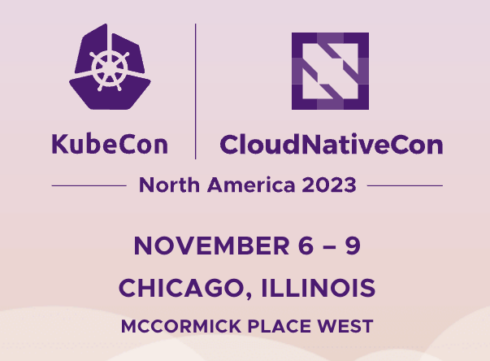
KubeCon + CloudNativeCon North America just kicked off this morning in Chicago, IL. Like always, the event results in a number of different Kubernetes vendors making announcements about updates to their offerings.
Here are a few highlights:
GKE Enterprise will be available November 15
GKE Enterprise is the premium version of Google Cloud’s Kubernetes service. It builds on Google Kubernetes Engine (GKE) with new additions like fleet team management, advanced Vulnerability Insights, managed governance and policy controls, and managed service mesh.
According to Google Cloud, customers already using GKE Enterprise have seen productivity improvements of 45% and reduced software deployment time by 70%.
Mezmo adds data profiling and responsive pipelines
The new features will enable customers to better understand, optimize, and respond to telemetry data. The new data profiling feature categorizes data to make it easier to see where it originated, what it contains, and important observability signals in the data. The responsive pipelines feature enables changes based on specific conditions, like during an incident where it would be important to capture more data or during data drift in source systems.
“Based on feedback from the many SREs we’ve spoken with, we know that the first step in getting the most from your telemetry data and your observability investments is to understand your data, which is why we’ve invested in Data Profiling,” said Tucker Callaway, CEO of Mezmo. “We also believe that telemetry pipelines must be responsive, not static. Our platform recognizes data drift or incidents detected within observability tools and then adjusts data streams and recommends remediation steps, so that teams can take immediate actions that improve mean time to resolution.”
Tigera updates Calico Open Source and Calico Cloud
Calico is the company’s networking and security solution for Kubernetes. Calico Cloud now gives a Security Score and Recommended Actions to give companies insight into how they can improve their security posture.
The company also introduced Kubernetes Cluster Mesh for VxLAN, which enables communication and security policy enforcement in Kubernetes clusters, ultimately resulting in greater observability.
Other new features include support for Windows HostProcess Container and support for IPv6 in the eBPF dataplane.
OpsMx announces new automated compliance capabilities
The tool can now automatically discover application and service structures from popular Kubernetes services or from CI/CD pipelines in ArgoCD, Jenkins, Spinnaker, GitHub Actions, and Azure DevOps.
There is also a new integration with the Kubernetes admission controller, enabling customers to enforce software delivery compliance.
The company also announced expanded compliance controls, which are all based on the NIST 800-53 standard. The company says that this expansion will make it easier for companies to compare their level of compliance against industry best practices.
Mirantis announces enterprise version of open source project k0smotron
K0smotron is a Kubernetes control plane manager, and now that it is enterprise ready, companies can use it to manage their production clusters and receive support from Mirantis in either an 8/5 or 24/7 support plan.
“As applications scale and become more complex, managing multiple Kubernetes clusters becomes increasingly challenging,” said Miska Kaipiainen, vice president of engineering, Mirantis. “k0smotron enables running and management of multiple Kubernetes cluster control planes as pods – within a single Kubernetes cluster – essentially Kubernetes within Kubernetes. It’s very light on resources and opens use cases for Kubernetes. For example, it’s ideal for organizations with multiple development teams, each requiring their own dedicated clusters on their preferred choice of infrastructure.”
Intuit releases data and stream processing engine, Numaflow
Numaflow is an open-source project that is now generally available with the 1.0 release. New features included in the 1.0 release are the ability to create and manage pipelines from the user interface, native support for streaming schematics, Role Based Access Control, and the ability to use user defined sources.
Numaflow is part of the larger project, Numaproj, which also includes Numalogic, which provides anomaly detection for machine learning models.
Aqua Security adds vulnerability scanning for Kubernetes components in Trivy
Trivy is an open-source solution developed by Aqua Security that searches for vulnerabilities, misconfigurations, and SBOMs.
According to the company, many of the existing scanning tools scan infrastructure only and don’t analyze Kubernetes components. The new feature makes use of KBOM, which is like a software bill of materials for Kubetnetes. With the new feature, companies will gain a better understanding of how their cluster security changes over time, be able to identify security issues, and determine when cluster components should be upgraded.
Sumo Logic releases HELM Chart V4
This new feature unifies data collection by allowing companies to package, configure, and deploy applications in Kubernetes with OpenTelemetry being used to collect metrics, events, logs, and traces.
According to Sumo Logic, this release unifies the OpenTelemetry pipeline and provides auto-instrumentation in collection and pre-created configurations to simplify infrastructure setup.
“Sumo Logic is continuing to deliver on our commitment to OpenTelemetry data collection to customers and the community,” said Tej Redkar, chief product officer for Sumo Logic. “Sumo Logic HELM Chart V4 evolves the collection experience for Kubernetes by using OpenTelemetry as its standard collector, and will help our customers get the insights they need to take action to uncover and resolve performance issues quickly, so DevOps teams can spend less time troubleshooting issues, and do what they do best – deploy code.”
Env0 announces new feature for automated environment creation in IaC deployments
The new Auto-Environments feature will streamline the ability to create, deploy, and destroy environments by working alongside companies’ Git repos, pull requests, and version control systems.
It enables flexible configuration rules based on repository, branch, or PR. Env0 environments will now be able to be updated through normal pull requests. Customers will also be able to use existing policy management and FinOps features to ensure security, compliance, and accurate cost estimation and controls.
“With the rapid adoption of Infrastracture-as-Code frameworks, it becomes crucial for organizations to accelerate deployment processes, while staying mindful of the financial, security, and reliability risks that could arise, as their operations evolve,” said Yuval Nelinger, director of product at env0.








